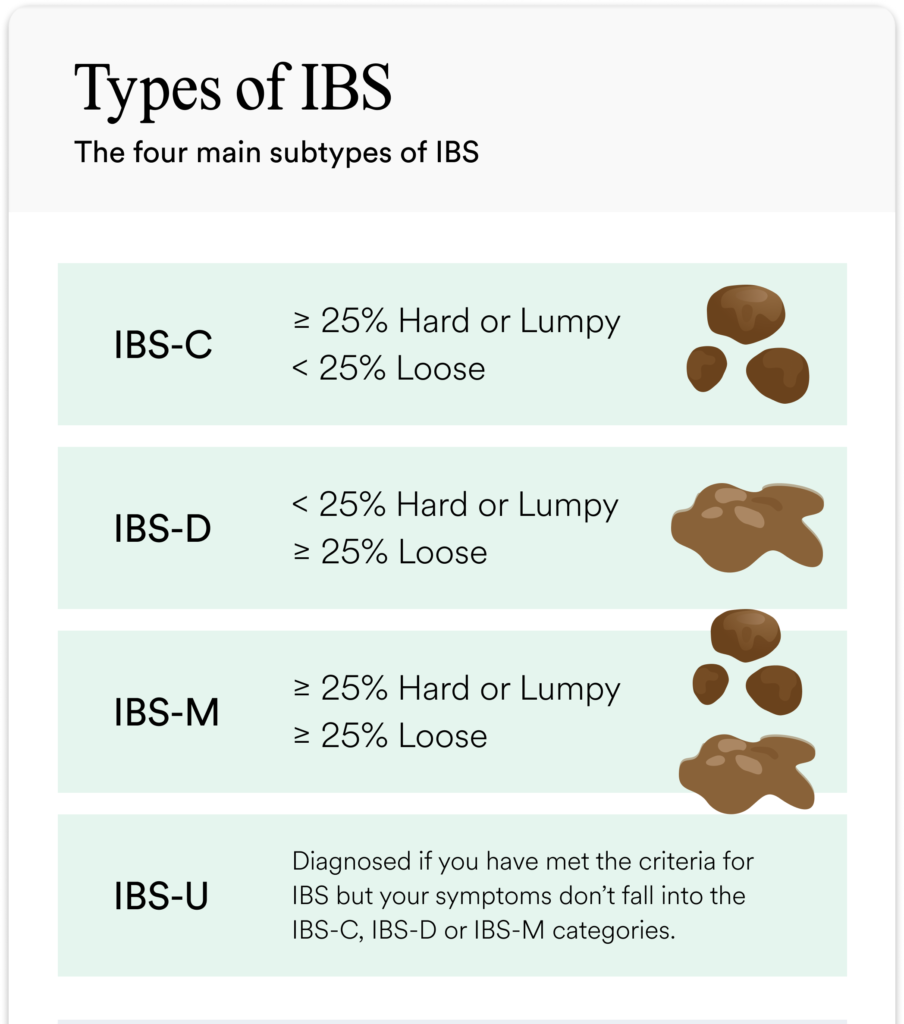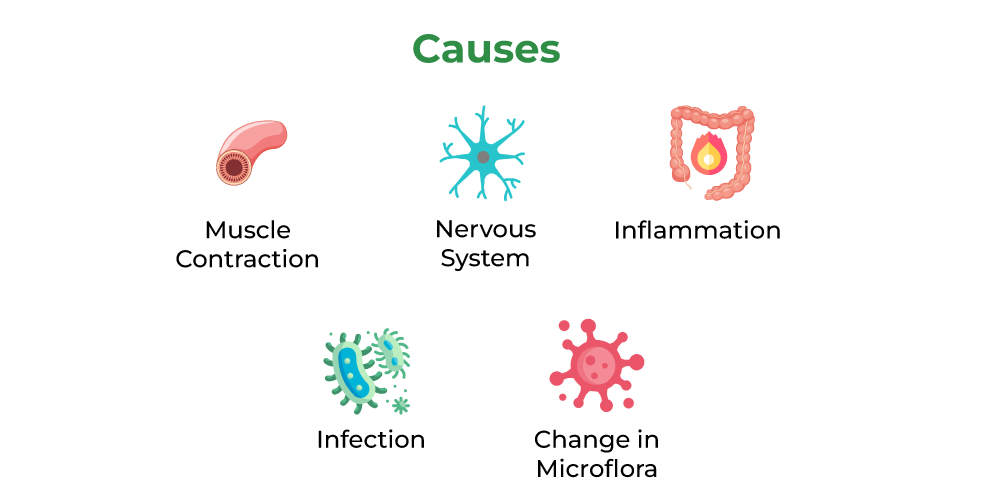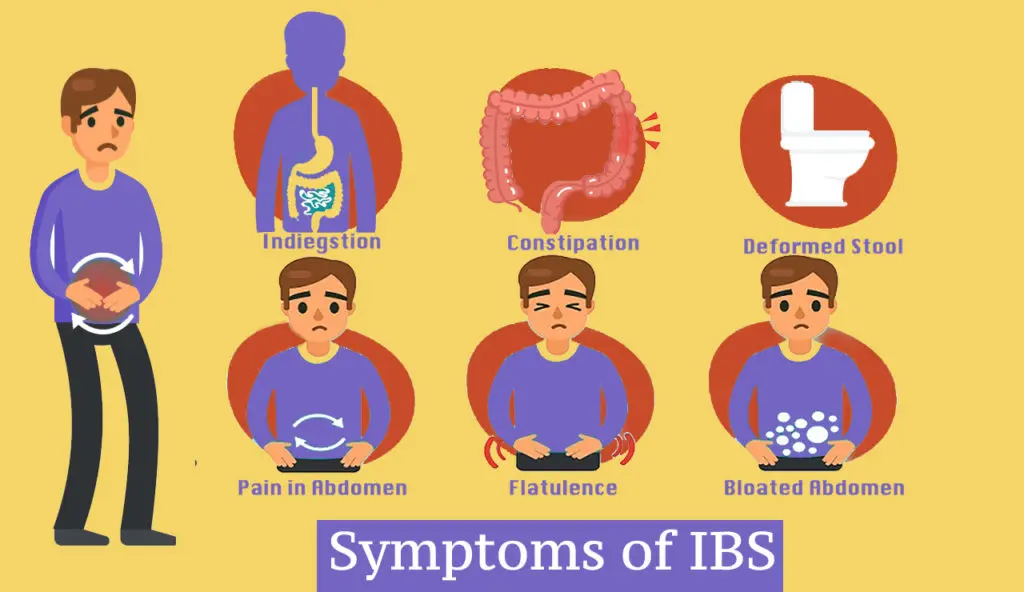This blog explains the best IBS treatment in homeopathy, its causes, symptoms, IBS types, risk factors, management & top medicines for complete cure.
IBS-Irritable Bowel Syndrome is a common disorder of the large intestine that causes uncomfortable or painful abdominal cramps, constipation, diarrhea, gas, and bloating are common complaints in IBS.
IBS is a kind of disorder that doesn’t damage the digestive tract or raise any risk for colon cancer.
Many people can often control the complaints of IBS through major changes in their diet and lifestyle.
IBS Types
Researchers usually categorize IBS based on the type of bowel movement problems patients have.
The kind of IBS can lead to a difference in its treatment, as certain medicines will only work for certain types of IBS.
Often, persons having IBS have normal bowel movements on some days and abnormal ones on other days.
The type of IBS a person has depends on the abnormal bowel movements they experience:
1)IBS with diarrhea (IBS-D): –Most of the time the stools are loose and watery.
2)IBS with constipation (IBS-C):- Most of the time the stools are hard and lumpy.
3)IBS with mixed bowel habits (IBS-M): – Sometimes the person may have both loose, watery movements and hard and lumpy bowel movements at different intervals on the same day.

IBS -Causes
The exact cause of IBS is not known. Various factors can play an important role in IBS they are listed below :
1)Contractions of muscles in the intestine:-
The intestinal walls are lined with layers of muscle that contract and relax this action moves food possible through your digestive tract.
Contractions that are stronger and remain for a longer time than normal can cause gas, bloating, and diarrhea.
Weak contractions can slow food movement and can lead to hard, dry stools.
2)Gastric infection:-
One can develop IBS after a severe bout of diarrhea or gastroenteritis caused by a virus or bacteria.
In a few people, IBS can also be associated with bacterial overgrowth in the intestinal tissues.
3)Abnormality in the functioning of the Nervous system:-
Abnormalities in the nerves in the digestive system of the person may cause one to experience greater than normal discomfort when your abdominal wall stretches due to gas or stool accumulation.
These weakly coordinated signals between the brain and the intestinal tract can cause the body to overreact to changes that regularly occur in the digestion process, this overreaction results in pain, constipation, or diarrhea.
4)Changes in healthy gut microbes
In IBS patients there are changes in bacteria, fungi, and viruses, which normally reside in the intestines, these microbes play a key role in the health of the digestive tract.
Researchers have found that the microbes in people with IBS might differ from those in healthy people.
5)Early life stress:-
It has been concluded from clinical data that people exposed to stressful events, especially in childhood, tend to have more symptoms of IBS.

Triggers
Symptoms of IBS can be triggered by:
1)Food allergy:-
The role of food allergy or intolerance in IBS is still under surveillance but many people have worsening IBS symptoms when they eat or drink certain foods or beverages, including wheat, dairy products, citrus fruits, beans, cabbage, carbonated drinks, and milk or milk products.
2)Stress-related:-
During increased stress periods, most people with IBS experience worse or more frequent signs and symptoms still stress may cause an increase in symptoms, but it doesn’t cause Ibs.
3)Other factors:-
They include genetic reactivation or stress-related, and external environmental or seasonal triggers.
IBS-Symptoms
The signs and symptoms of IBS may vary but are usually they are present for a long time.
The most common symptoms are:
- Abdominal pain, cramps, or bloating of the abdomen that is related to passing a bowel movement
- Bowel movement, there can be diarrhea or constipation, or both.
- There are changes in how often the patient is having a bowel movement
Few symptoms that are often related are bloating, and increased gas or mucus in the stools.
One should see a doctor if one has a persistent change in bowel habits or other signs or symptoms of IBSas they may indicate a more serious condition, such as colon cancer.
More-serious signs and symptoms of IBS are:
- Difficulty in swallowing food
- Diarrhea at night
- The patient may complain of persistent pain that is not at all relieved by passing gas or a bowel movement
- Vomiting without reason
- Weight loss is observed
- There can be rectal bleeding
- Iron deficiency anemia

Complications of IBS-irritable bowel syndrome
Chronic constipation or diarrhea can lead to hemorrhoids.
2)Poor quality of life:-
IBS is associated with poor quality of life one of the complicaions of the disease.
Most people with moderate to severe IBS report a poor quality of life, people with IBS miss three times as many days from work as do those without bowel symptoms.
3)Mood disorders:-
People experiencing the signs and symptoms of IBS for a long are easily depressed or suffer from anxiety.
This Depression and anxiety can further make IBS worse.
Risk Factors For IBS-Irritable Bowel Syndrome
- IBS most often occurs in people in their late teens to early 40s, women can be twice as likely as men to get IBS.
- IBS may happen to multiple family members.
One may be at higher risk if one has one of the following:
- Emotional and mental stress at work or home, tension or constant anxiety
- Intolerance of certain food
- Any history of physical or sexual abuse
- A serious form of digestive tract infection
Diagnosis of IBS
There is no test to definitively diagnose IBS, still, the doctor is likely to start the case by taking a complete medical history, physical exam, and tests to rule out other conditions related to intestinal diseases, colon cancer. Only after other conditions have been ruled out, the doctor is likely to use one of these sets of diagnostic criteria for IBS:
Type of IBS:-
For treatment, IBS can be divided into three types, based on symptoms: constipation-predominant, diarrhea-predominant or mixed.
Rome criteria:-
These criteria include abdominal pain and discomfort lasting on average for at least one day a week in the last three months, associated with two of the factors: Pain and discomfort are related to defecation, the frequency of defecation is altered, or stool consistency is altered.
The doctor will also assess the patient if they have other signs or symptoms that might suggest another or some more serious condition.
The more serious signs and symptoms are:
- The onset of signs and symptoms after age 50
- Difficulty in swallowing food
- Diarrhea at night
- The patient may complain of persistent pain that is not at all relieved by passing gas or a bowel movement
- Vomiting without reason
- Weight loss is observed
- There can be rectal bleeding
- Iron deficiency anemia
If one has these signs or symptoms, or if initial treatment for IBS is not giving results then the doctor is likely to advise additional tests.
Additional tests
A doctor may advise several tests, they include stool studies to check for infection or problems with the ability of the intestine to take in the nutrients from food or any malabsorption. Other tests can also be advised.
Diagnostic procedures that can be advised are:-
Colonoscopy:-
Doctors will use a small, flexible tube to examine the entire length of the colon.
X-ray or CT scan:-
These tests produce images of the abdomen and pelvis that might allow your doctor to rule out other reasons for your symptoms, especially if you have abdominal pain.
Your doctor might fill your large intestine with a liquid (barium) to make any problems more visible on an X-ray. This is a barium meal swallow test.
Upper digestive tract endoscopy:-
A long, flexible tube is inserted down through the throat and into the tube connecting your mouth and stomach to the esophagus.
A camera on the end of the tube allows the doctor to inspect your upper digestive tract and get a tissue sample for biopsy from your small intestine and fluid to look for overgrowth of bacteria.
The doctor might recommend endoscopy if celiac disease is suspected.
Laboratory tests can include:
Lactose intolerance tests:-
Lactase is an enzyme needed for digesting the sugar found in dairy products.
If your body doesn’t produce lactase, there may be a problem similar to those caused by IBS along with abdominal pain, gas, and diarrhea. The doctor may ask to do a breath test or ask you to remove milk and milk products from your diet for several weeks.
Breath test for bacterial overgrowth:-
A breath test determines if one has bacterial overgrowth in the small intestine. Bacterial overgrowth is more common among people who have had bowel surgery or who have diabetes or some other disease that slows down digestion.
Stool tests:-
Your stool might be examined for bacteria or parasites, or a digestive liquid produced in your liver like the bile acid if one has chronic diarrhea.
IBS Management
Treatment of IBS focuses on relieving symptoms so that one can live as normally as possible.
The mild form of symptoms can be controlled by reducing stress and by making changes in diet and lifestyle like:
• Try to avoid foods that trigger your symptoms
• Eat high-fiber rich foods
• Intake of plenty of fluids
• Regular exercise
• Enough sleep
The doctor may advise reducing a few things in diet:-
•High-gas foods:-
If one experiences bloating or gas, one might avoid items such as carbonated and alcoholic beverages and certain foods that may lead to increased gas.
•Gluten:-
Research shows that people with IBS report an improvement in diarrhea symptoms if they stop eating gluten content food like wheat, barley, and rye, even if they do not have celiac disease.
•FODMAPs:-
Some people are sensitive or allergic to certain carbohydrates such as fructose, fructans, lactose, and others, known as FODMAPs — fermentable oligosaccharides, disaccharides, monosaccharides, and polyols.
FODMAPs are found in certain grains, vegetables, fruits, and dairy products.
A dietitian can help you with these diet changes.
Counseling
If problems are moderate or severe, doctors might suggest counseling — especially if one has depression or stress, which tends to worsen your symptoms.
Medication
Based on symptoms, the doctor might suggest medications :
• Fiber supplements:- Taking a supplement such as psyllium (Metamucil) with fluids.
• Laxatives:-over-the-counter laxatives, such as magnesium hydroxide oral (Phillips’ Milk of Magnesia) or polyethylene glycol (Miralax).
• Anti-diarrheal medications:- Over-the-counter medications, such as loperamide (Imodium A-D), can help control diarrhea.
• Anticholinergic medications:- Medications such as dicyclomine (Bentyl) can help relieve painful bowel spasms.
• Tricyclic antidepressants:- Lower dose of imipramine -Tofranil, desipramine -Norpramin.
• SSRI antidepressants:-Selective serotonin reuptake inhibitor (SSRI) antidepressants, such as fluoxetine -Prozac, Sarafem, or paroxetine -Paxil, may help in depression, pain, and constipation.
• Pain medications:- Pregabalin -Lyrica or gabapentin -Neurontin might ease severe pain or bloat.
Medications specifically for IBS
Medications approved for certain people with IBS include:
• Alosetron -Lotronex
• Eluxadoline -Viberzi
• Rifaximin -Xifaxan
• Lubiprostone -Amitiza
• Linaclotide -Linzess
Lifestyle and home remedies
Simple changes in your diet and lifestyle often provide relief from IBS. Your body will need time to respond to these changes. Try to:
• Experiment with fiber:-Foods such as whole grains, fruits, vegetables, and beans are good in fiber, these supplements might cause less gas and bloat than fiber-rich foods.
• Avoid problem foods, and eliminate foods that trigger IBS symptoms.
• Eat at regular times.
• Exercise regularly, as it helps relieve depression and stress, stimulates normal contractions of intestines, and can help one feel better about oneself.
Alternative medicine
The role of alternative therapies in relieving IBS symptoms is unclear. Ask your doctor before starting any of these treatments. Alternative therapies include:
• Hypnosis:- A trained professional is needed who teaches you hypnosis, it may reduce abdominal pain and bloat.
• Peppermint:- People who have IBS with diarrhea, a specially coated tablet that slowly releases peppermint oil in the small intestine eases bloating, urgency, abdominal pain, and pain while passing stool.
• Probiotics:-
Probiotics are good bacteria that normally live in your intestines and are found in certain foods, such as yogurt, and in dietary supplements, they may relieve IBS symptoms, such as abdominal pain, bloating, and diarrhea.
• Stress reduction:-Yoga or meditation help relieve stress. You can take classes or practice at home using books or videos.
IBS Treatment in Homeopathy – Best Medicines
1. LYCOPODIUM CLAVATUM-IBS with food intolerance
Symptoms
This is a great remedy when IBS is due to food intolerances, especially onions, oysters, cabbage, and beans.
The abdominal pains are worse in the evening, typically from 4- 8 pm, and are relieved by passing wind very frequently.
Due to inflammation of the digestive tract, it is not able to get enough nutrition from food, so there can be a loss of weight, along with fullness and bloating in the abdomen.
There is marked changeability in appetite and it can go from being ravenous to very full after a few mouthfuls.
Potency & dosage
30 CH Potency,4 globules three times a day is used. Gradually, one can increase the potency depending upon the case’s progress.
2) COLOCYNTHIS-For IBS with terrible cramps
Symptoms
This is a wonderful remedy for IBS with terrible stomach cramps that are better for doubling up and are worse from anger or indignation.
The stomach pains are short, sharp & pinching, and aggravated after eating, especially fruit.
It is indicated when heat and pressure reduces the pains,and the painful cramps extend to the lower back or into the buttocks.
Potency & dosage
200 CH Potency,4-8 globules daily ones are used. Gradually, one can increase the potency depending upon the case’s progress.
3) NUX VOMICA-For IBS stressful lifestyle
Symptoms
This is a useful remedy for people who are working hard and playing harder, eventually, this stressful lifestyle takes its toll, and the digestive system suffers.
There are severe stomach cramps and acid reflux that are aggravated by mental exertion or stress, with hiccoughs, belching, fullness, and indigestion worse after coffee, spicy foods, and smoking.
There is a lot of nausea and feelings of being seasick.
Potency & dosage
30 CH Potency,4 globules three times a day is used. Gradually, one can increase the potency depending upon the case’s progress.
4) ARSENICUM ALBUM-For IBS on eating cold food
Symptoms
It is a great remedy when stomach cramps are worse after taking cold food and drinks.
This remedy is useful for people who always feel chilly; so much so that even eating cold food such as ice cream aggravates.
There is a great deal of diarrhea that can come on after cold drinks and moving around makes everything worse.
All the symptoms are better by taking regular sips of a warm drink and lying down to rest.
Potency & dosage
30 CH Potency,4 globules three times a day is used. Gradually, one can increase the potency depending upon the case’s progress.
5) ARGENTUM NITRICUM:-For IBS with anticipatory anxiety
Symptoms
It is an indicated remedy for IBS, there is a lot of wind, with very loud and forceful belching or flatulence.
The patient has nausea and indigestion associated with nervousness or anxiety, especially when anticipating a stressful event like a job interview or exam.
Potency & dosage
30 CH Potency,4 globules three times a day is used. Gradually, one can increase the potency depending upon the case’s progress.
6) SULPHUR-For IBS with burning in the abdomen
Symptoms
It is a wonderful remedy for IBS, there are stomach cramps aggravated by touch, with severe burning pains in the stomach worse in the morning and at night.
The appetite is usually increased, especially around 11 am with an empty all-gone sensation in the stomach.
The stomach feels very heavy straight after eating food.
Potency & dosage
30 CH Potency,4 globules three times a day is used. Gradually, one can increase the potency depending upon the case’s progress.
7) BRYONIA ALBA -For IBS on eating bread
Symptoms
A useful remedy in IBS is where the symptoms come after eating bread and where the thirst is increased.
The stomach may feel so heavy that it is like a stone is sitting there in the abdomen.
There is belching that relieves the pain and tastes of undigested food. Tight clothing and walking about also worsen the IBS condition.
Potency & dosage
30 CH Potency,4 globules three times a day is used. Gradually, one can increase the potency depending upon the case’s progress.
8) CARBO VEGETABILIS:-For IBS in elderly
Symptoms
The remedy is a specific remedy suited to IBS in older people or those suffering from general fatigue with stomach pains, burning, soreness, or pressing pain in the stomach.
Cramps that feel like the stomach is being contracted with a lot of bloating after eating are experienced by the patient.
It is highly indicated when food like butter, fats & rich foods can cause belching, heartburn, and indigestion with weakness or faintness.
Potency & dosage
30 CH Potency,4 globules three times a day is used. Gradually, one can increase the potency depending upon the case’s progress.
9)CHINA -For IBS due to weak digestion
Symptoms
It is indicated when there is stomach acidity with a great deal of bloating & bitter or sour belching.
It is indicated when the appetite swings from being ravenous to being completely off food, with a feeling of fullness after eating a small amount.
It is indicated when food like fruit and milk aggravates and the stomach pains are pressing in general.
There is soreness in the stomach and digestion, in general, is very slow.
Potency & dosage
30 CH Potency,4 globules three times a day is used. External application of ointment along with internal medicine is advisable.
10) NATRUM MURIATICUM -For IBS with emotional disturbance
Symptoms
It is a great remedy for IBS when there is Indigestion after too much starchy food with sour belching & terrible hiccough.
There are painful stomach cramps, aggravated by touch.
It is a top-listed remedy when IBS occurs due to strong emotions such as grief, or dwelling on the past, which aggravates the condition.
Potency & dosage
30 CH Potency,4 globules three times a day is used. Gradually, one can increase the potency depending upon the case’s progress.
Remember that homeopathic remedies should be prescribed based on individual symptoms and characteristics. It’s crucial to consult with a qualified homeopath for proper evaluation and personalized treatment. Homeopathy focuses on treating the whole person, so a detailed case study is necessary to select the most appropriate remedy for this condition.
Homeopathic medicines should be taken only when prescribed by a homeopathic physician. Self-medication may aggravate the original conditions.

